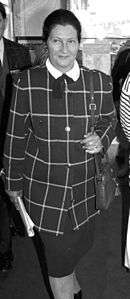Simone Veil
Simone Annie Liline Veil, Grand-croix; DBE (French: [simɔn vɛj] (![]()
Simone Veil | |
|---|---|
.jpg) | |
| 12th President of the European Parliament | |
| In office 17 July 1979 – 19 January 1982 | |
| Preceded by | Emilio Colombo |
| Succeeded by | Piet Dankert |
| Minister of Health | |
| In office 29 March 1993 – 18 May 1995 | |
| President | François Mitterrand |
| Prime Minister | Édouard Balladur |
| Deputy | Philippe Douste-Blazy |
| Preceded by | Bernard Kouchner |
| Succeeded by | Élisabeth Hubert |
| In office 27 May 1974 – 4 July 1979 | |
| President | Valéry Giscard d'Estaing |
| Prime Minister | Jacques Chirac Raymond Barre |
| Preceded by | Michel Poniatowski |
| Succeeded by | Michel Poniatowski |
| Member of the European Parliament for France | |
| In office 17 July 1979 – 30 March 1993 | |
| Preceded by | Constituency established |
| Succeeded by | Jean-Marie Vanlerenberghe |
| Member of the Constitutional Council | |
| In office 1998–2007 | |
| President | Jacques Chirac |
| Preceded by | Jean Cabannes |
| Succeeded by | Renaud Denoix de Saint Marc |
| Personal details | |
| Born | Simone Annie Liline Jacob 13 July 1927 Nice, France |
| Died | 30 June 2017 (aged 89) Paris, France |
| Political party | Independent (1974–1979) UDF (1979–1997) UDI (2012–2017) |
| Spouse(s) | |
| Children | 3 sons |
| Alma mater | University of Paris Sciences Po |
A survivor of the Auschwitz-Birkenau concentration camp where she lost part of her family during the Holocaust;[1] she served as the first president of the Fondation pour la Mémoire de la Shoah, from 2000 to 2007,[2] and subsequently as honorary president. She was elected to the Académie française in November 2008. She was best known for ministerially pushing forward the law legalizing abortion in France on 17 January 1975. She and her husband were buried in the Panthéon on 1 July 2018.[3] Only the fifth woman in history to be accorded this burial honor, her eulogy was given, during the reinterment ceremony, by President Emmanuel Macron.[4]
Early years and private life
Veil was born Simone Annie Liline Jacob in Nice, Alpes-Maritimes, France, the daughter of Yvonne (Steinmetz) and André Jacob, an architect.[1] She completed her baccalauréat on 28 March 1944 and was arrested by German authorities days later.[2][5] Veil's Jewish family—Simone, her mother and one sister, Madeleine (nicknamed Milou)—were deported to Auschwitz-Birkenau. They were later transferred to Bergen-Belsen, where her mother Yvonne died of typhus shortly before the camp's 15 April 1945 liberation. Veil's father and brother also died; they are last known to have been sent on a transport to Lithuania.[1] Veil's other sister, Denise, who had been arrested as a member of the Resistance in 1944 and tortured by the Gestapo before being imprisoned at Ravensbrück and Mauthausen, survived and was accorded multiple honors for valor.[6] Milou died in a car crash in the 1950s. Veil returned to speak at Auschwitz-Birkenau in 2005 for the 60th anniversary of the liberation of the camps.[7]
After the liberation, she began to study law and political science at Sciences Po and at the University of Paris, where she met her future husband Antoine Veil.[8] The couple married on 26 October 1946, and had three sons: Jean, Claude-Nicolas, and Pierre François. Her husband died at the age of 86 on 12 April 2013, after 66 years of marriage.[9] Claude-Nicolas died in 2002.[10]
Political career

Ministry of Justice, 1956–1974
After graduating from Institut d'études politiques de Paris with a law degree, Veil spent several years practicing law. In 1956, she passed the national examination to become a magistrate.[1] She entered and held a senior position at the National Penitentiary Administration under the Ministry of Justice. She was responsible for judicial affairs and improved women's prison conditions and the treatment of incarcerated women.[11] In 1964, she left to become the director of civil affairs, where she improved French women's general rights and status.[1] She successfully achieved the right to dual parental control of family legal matters and adoptive rights for women.[1] In 1970, she became secretary general of the Supreme Magistracy Council (fr:Conseil supérieur de la magistrature).[11]
Minister of Health, 1974–1979
From 1974 to 1979, Veil was a Minister of Health in the governments of prime ministers Jacques Chirac and Raymond Barre: from 28 May 1974 to 29 March 1977, Minister of Health; from 29 March 1977 to 3 April 1978, Minister of Health and Social Security; and from 3 April 1978 to 4 July 1979, Minister of Health and Family.
She pushed forward two notable laws. The first, passed on 4 December 1974, facilitated access to contraception, the sale of contraceptives such as the combined oral contraceptive pill having been legalized in 1967.
The second, passed on 17 January 1975, legalized abortion in France, her hardest political fight and for which she is best known. The abortion debate was a particularly difficult time as those in favor of keeping abortion illegal launched aggressive personal attacks against Veil and her family.[1] However, since the passing of the law, many have paid tribute to Veil and thanked her for her courageous and determined fight.[1]
In 1976, Veil helped to introduce a ban on smoking in certain public places, and worked on the problem of medically underserved rural areas.[10]
European Parliament, 1979–1993
In 1979, Veil was elected as a Member of the European Parliament in the first European parliamentary election. In its first session, the new Parliament elected Veil as its first President,[10] a position she held until 1982.[12] The archives concerning her term as President of the European Parliament are deposited at the Historical Archives of the European Union in Florence.[13]
In 1981, Veil won the prestigious Charlemagne Prize an award given to honour the contributions made by individuals to the unity of Europe.[14]
After the end of her term as president, in 1982, she remained a member of the European Parliament. She became Chair of the European Liberal Democrat and Reform Party until 1989. She was re-elected for the last time in the 1989 election, standing down in 1993.[12]
Between 1984 and 1992, she served on the Committee on the Environment, Public Health and Food Safety, and the Committee on Political Affairs. After standing down from these committees, she served on the Committee on Foreign Affairs and its related Subcommittee on Human Rights. Between 1989 and 1993, she was also a member of Parliament's delegation to the ACP-EU Joint Parliamentary Assembly, serving as its vice-chairwoman until 1992.[12]
Return to French Government, 1993–1995
From 31 March 1993 to 16 May 1995, Veil was again a member of the cabinet, serving as Minister of State and Minister of Health, Social Affairs and the city in the government of Prime Minister Édouard Balladur.[15] In the mid-1990s, she worked to help the disabled, HIV-positive patients, and mothers of young children.[10]
Member of the Constitutional Council, 1998
In 1998, she was appointed to the Constitutional Council of France. In 2005, she put herself briefly on leave from the council in order to campaign in favour of the Treaty establishing a Constitution for Europe. This action was criticized, because it seemed to contradict the legal provisions that members of the council should keep a distance from partisan politics: the independence and impartiality of the council would be jeopardized, critics said, if members could put themselves "on leave" in order to campaign for a project.[16] In response, Veil said that she, the President of the Constitutional Council and colleagues had deliberated on the issue beforehand and they had given her permission to take her leave without having to resign. Being a staunch supporter of the European project, she believed others should not "ignore the historical dimension of European integration".[16]
Honors and other activities, 1989–2018
In 1998, she was awarded as Honorary Dame of the Order of the British Empire (DBE) by the British government.[17] She was a Member of the Constitutional Council of France from March 1998 to March 2007.
In 2003, she was elected to the Board of Directors of the International Criminal Court's Trust Fund for Victims.[18]
In 2005, she was awarded the Prince of Asturias Award in International Cooperation.
In 2007, she was awarded the North-South Prize of the Council of Europe.
In 2007, Veil surprised many observers by declaring her support for the neo-conservative presidential candidate Nicolas Sarkozy. She was by his side on the day after he received 31 percent of the vote in the first round of the presidential elections that year.[19]
Veil entered the Académie française in 2008, the sixth woman ever to do so.[20] Veil joined the Academy's forty "immortals" at their 13th seat, once the seat of Jean Racine. Her induction address was given in March 2010 by Jean d'Ormesson. On her sword, given to her as to every other immortal, is engraved her Auschwitz number (number 78651), the motto of the French Republic (liberté, égalité, fraternité) and the motto of the European Union (Unis dans la diversité).[21]
In 2008, she won the Charles V Prize, awarded by the Fundación Academia Europea de Yuste in honor of "her acknowledged merits in the struggle for the advancement of women's equality."
In 2010, she received the Coudenhove-Kalergi Badge by the Europa-Union Münster.[22]
She participated as jury member for the Conflict Prevention Prize awarded every year by the Fondation Chirac.[23]
In 2012, she was appointed a Grand Cross of the Légion d'honneur.[24]
In 2018, she was the subject of a €2 commemorative coin, which design included her deportation registration number, the European Parliament and the year "1975" signifying the legalisation of abortion.[25]
Death


Veil died at home on 30 June 2017, two weeks before her 90th birthday.[26] Her son Jean said at her public ceremony on 5 July, "I forgive you for having poured water over my head", in reference to an event where she had emptied a carafe of water over his head in disgust at what she considered to be his misogynist remarks.[10]
On 5 July 2017, Veil was honoured with a national ceremony and military honours in les Invalides courtyard,[27] after which she was interred next to her husband, who died in 2013, at Montparnasse Cemetery.[28] The ceremony at les Invalides was attended by President Macron, Holocaust survivors, politicians and dignitaries. In his speech during the ceremony, Macron announced the decision to rebury Veil and her husband in the Panthéon,[29] which was done on 1 July 2018.
Honorary degrees
An honorary degree is an academic degree for which a university has waived all of the usual requirements, such as matriculation, attendance, course credits, a dissertation, and the passing of comprehensive examinations.
- Princeton University (United States), 1975
- Weizmann Institute of Science (Israel), 1976
- Bar-Ilan University (Israel), 1979
- University of Cambridge (England), 1980
- Hebrew University of Jerusalem (Israel), 1980
- Yale University (United States), 1980
- University of Edinburgh (Scotland), 1980
- Georgetown University (Washington, DC, United States), 1981
- University of Urbino (Italy), 1981
- University of Sussex (England), 1982
- Yeshiva University of New York (United States), 1982
- Université libre de Bruxelles (Belgium), 1984
- American University of Paris (France), 1988
- Brandeis University (United States), 1989
- University of Glasgow (Scotland), 1995
- University of Pennsylvania (United States), 1997
- University of Cassino and Southern Lazio (Italy), 2006
- Ben-Gurion University of the Negev (Israel), 2010
Simone Veil Prize
In 2018, the government of France established a prize in memory of Veil to honour people who fight for women's causes. The intent is to draw attention to efforts in promoting women's autonomy, education, participation in leadership roles, and freedom from violence and discrimination.[30] The prize is awarded each year on 8 March, International Women's Day, with €100,000 to support work in the winner's area of concern. On 8 March 2019, the first Simone Veil Prize was awarded to Aissa Doumara Ngatansou, co-founder of the Association for the Elimination of Violence against Women (ALVF) in Cameroon.[30][31]
References
- Hottell, Ruth. "Simone Veil". Jewish Women's Archive. Retrieved 2 July 2014.
- Chan, Sewell (30 June 2017). "Simone Veil, Ex-Minister Who Wrote France's Abortion Law, Dies at 89". The New York Times.
- Willsher, Kim (30 June 2018). "France pays tribute to Simone Veil with hero's burial in the Panthéon". the Guardian. Retrieved 1 July 2018.
- Katz, Brigit. "France's Simone Veil Will Become the Fifth Woman Buried in the Panthéon". Smithsonian. Retrieved 1 July 2018.
- "Veil, Simone (1927—) | Encyclopedia.com". www.encyclopedia.com.
- "Mort de la résistante Denise Vernay" ("Death of the Resistant Denise Vernay"). Paris, France: Libération, 16 March 2013.
- "Simone Veil". France in the United Kingdom. Archived from the original on 20 February 2012. Retrieved 30 January 2017.
- "Une vie (Simone VEIL)". Politique (in French). Retrieved 2 July 2014.
- "Mort d'Antoine Veil, mari de Simone Veil". Le Monde.fr (in French). 12 April 2013. Retrieved 2 July 2014.
- Barbara Casassus Obituary Simone Veil. Lancet, Volume 390, No. 10092, p356, 22 July 2017
- "Simone Veil, défenseuse de l'avortement". L'histoire par les femmes (in French). 14 February 2014. Retrieved 2 July 2014.
- "Simone VEIL: History of parliamentary service". Europa.eu. European Parliament. Retrieved 30 January 2017.
- "Cabinet de la Présidence Simone Veil". archives.eui.eu. Retrieved 23 February 2018.
- "Bahrain business pioneer Veil mourned". Trade Arabia. Archived from the original on 7 July 2014. Retrieved 2 July 2014.
- Décret n° 76 du 30 MARS 1993 RELATIF LA COMPOSITION DU GOUVERNEMENT (in French)
- "Référendum : Simone Veil répond à Debré". My TF1 News (in French). Archived from the original on 14 July 2014. Retrieved 30 January 2017.
- Veil, Simone (1 September 2009). A life. Haus Publishing.
- "International Criminal Court's Trust Fund: Amnesty International welcomes the election of a Board of Directors" (Press release). Amnesty International. 12 September 2003. Archived from the original on 16 November 2004. Retrieved 30 January 2017.
- "Simone Veil rejoint Nicolas Sarkozy". My TF1 News (in French). Archived from the original on 7 July 2014. Retrieved 2 July 2014.
- Erlanger, Steven (18 March 2010). "France: Ex-Minister To Join Academy". The New York Times. Retrieved 8 November 2010.
- "Simone Veil, une icône à l'Académie" [Simone Veil : an icon in the 'Académie']. Le Parisien (in French). 18 March 2010. Retrieved 30 January 2017.
- "Coudenhove-Kalergi-Plakette: Preisträger" [Coudenhove-Kalergi Badge: Recipients]. Europa Union Deutschland, Kreisverband Münster (in German). Retrieved 30 January 2017.
- "The Jury". Fondation Chirac.
- "Simone Veil faite grand'croix de la Légion d'honneur" [Simone Veil made Grand Cross of the Legion of Honor]. Le Parisien (in French). 10 September 2012. Retrieved 9 January 2017.
- "C_2018155EN.01000301.xml". eur-lex.europa.eu.
- "Simone Veil est décédée à 89 ans". Le Journal du Dimanche (in French). 30 June 2017.
-
- Roe, David (5 July 2017). "France buries women's rights icon Simone Veil". en.rfi.fr.
-
- Breeden, Aurelien (5 July 2017). "Simone Veil to Be Laid to Rest in Panthéon, Among France's Revered". The New York Times. ISSN 0362-4331.
- "Launch of the Simone Veil Prize of the French Republic". France Diplomatie. 8 March 2019. Retrieved 3 June 2019.
- "Cameroon women's activist wins award in memory of French icon Simone Veil". France24. 8 March 2019. Retrieved 3 June 2019.
External links
![]()
| Political offices | ||
|---|---|---|
| Preceded by Michel Poniatowski |
Minister of Health 1974–1979 |
Succeeded by Michel Poniatowski |
| Preceded by Emilio Colombo |
President of the European Parliament 1979–1982 |
Succeeded by Piet Dankert |
| Preceded by Bernard Kouchner |
Minister of Health 1993–1995 |
Succeeded by Élisabeth Hubert |
| Academic offices | ||
| Preceded by Dries van Agt |
Invocation Speaker of the College of Europe 1980 |
Succeeded by Bruno Kreisky |
| Awards | ||
| Preceded by Emilio Colombo |
Recipient of the Charlemagne Prize 1982 |
Succeeded by Juan Carlos of Spain |
| Preceded by Erasmus Programme |
Recipient of the Prince of Asturias Awards 2005 |
Succeeded by Bill and Melinda Gates Foundation |
| Legal offices | ||
| Preceded by Jean Cabannes |
Member of the Constitutional Council 1998–2007 |
Succeeded by Renaud Denoix de Saint Marc |
| Honorary titles | ||
| Preceded by Pierre Messmer |
Member of the Académie française 2008–2017 |
Vacant |
